Best Supplements for Students During Exam Season: Focus, Energy, and Memory Support
Introduction
Exams test more than just your knowledge — they test your stamina, memory, focus, and stress resilience.
During exam season, students often burn the candle at both ends — late nights, early mornings, caffeine overload, and information overload. It’s no surprise that concentration dips, fatigue sets in, and the brain begins to feel foggy.
While there’s no magic pill for instant intelligence, the right supplements can nourish your brain, improve focus, stabilize energy, and help you recall information under pressure. Combined with healthy study habits, these natural compounds can help you perform at your best — mentally sharp, emotionally calm, and physically balanced.
Let’s explore the top science-backed supplements for students — what they do, how they work, and how to combine them into an effective study stack.
Looking for supplements for Memory And Focus? Click here.
🧠 Why the Brain Struggles During Exam Season

Before diving into supplements, it’s important to understand what’s happening inside your brain during periods of intense studying.
When you study for long hours, your brain demands:
More energy (in the form of glucose and oxygen)
More neurotransmitter production (like acetylcholine and dopamine)
More stress hormone regulation (like cortisol)
Unfortunately, exam season often brings:
Poor sleep and irregular meals
High stress and anxiety
Overuse of caffeine
Sedentary study sessions
This combination depletes the very nutrients your brain depends on — leading to burnout, memory lapses, and lack of focus.
That’s where targeted nutrition and supplements can make all the difference.
🧩 The Foundation: How Supplements Support Brain Function
Supplements work best when they support these four pillars of cognitive performance:
Energy & Mitochondrial Support – Keeps brain cells energized for long study hours.
Memory & Learning Enhancement – Improves information recall and neural connectivity.
Focus & Attention Regulation – Stabilizes neurotransmitters for concentration without jitters.
Stress & Sleep Management – Balances cortisol and promotes recovery for optimal performance.
The best study supplements are those that target multiple pillars at once, supporting the brain holistically.
Looking for supplements for Memory And Focus? Click here.
🌞 Omega-3 Fatty Acids (DHA + EPA) — Brain Fuel and Memory Foundation
Your brain is nearly 60% fat — and omega-3 fatty acids, particularly DHA, are critical components of brain cell membranes. DHA and EPA help neurons communicate efficiently and reduce inflammation that can slow mental processing.
💡 Benefits for Students
Improves focus and learning capacity
Enhances memory retention
Reduces stress and anxiety
Supports overall brain resilience
📚 Research Insight
A 2013 study in Nutritional Neuroscience found that young adults who supplemented with DHA performed better on memory tasks and had lower stress markers during exams.
💊 Recommended Dose
1,000–2,000 mg/day combined EPA + DHA
Choose high-quality fish oil or algae-based (vegan) supplements.
Take with breakfast containing healthy fats for better absorption.
🌿 Bacopa Monnieri — The Memory Herb of Ayurveda
If there’s one herb every student should know about, it’s Bacopa Monnieri. Known for centuries in Ayurvedic medicine, Bacopa enhances memory, learning, and cognitive speed — especially under pressure.
💡 Benefits for Students
Boosts long-term memory consolidation
Enhances focus and recall speed
Reduces anxiety and exam stress
📚 Research Insight
A 2016 meta-analysis published in Frontiers in Aging Neuroscience showed that Bacopa significantly improved memory retention and reduced reaction times in healthy adults.
💊 Recommended Dose
300–600 mg/day standardized to 50% bacosides
Take with food (preferably with fats) for better absorption
Best taken daily for 8–12 weeks before exams for optimal effects
⚡ Rhodiola Rosea — Adaptogen for Stress and Mental Stamina
Exams are stressful — mentally, emotionally, and physically. Rhodiola Rosea is an adaptogen that helps your body adapt to stress while boosting focus, energy, and motivation.
💡 Benefits for Students
Reduces cortisol and feelings of burnout
Improves mental clarity under fatigue
Enhances alertness and mood
📚 Research Insight
In a 2012 study, medical students taking Rhodiola for two weeks showed significant improvements in fatigue, anxiety, and concentration compared to placebo.
💊 Recommended Dose
200–400 mg/day standardized to 3% rosavins and 1% salidroside
Take in the morning before studying
Avoid taking late in the day (may be stimulating)
☕ L-Theanine + Caffeine — The Calm Focus Combo
Caffeine is the student’s go-to stimulant — but by itself, it can cause jitters, crashes, and anxiety. When paired with L-theanine (an amino acid from green tea), it produces calm alertness without overstimulation.
💡 Benefits for Students
Improves attention span
Smooths energy levels (no crash)
Reduces nervousness and test anxiety
📚 Research Insight
A study in Nutritional Neuroscience found that combining 200 mg of L-theanine with 100 mg of caffeine improved task accuracy, focus, and reaction time compared to caffeine alone.
💊 Recommended Dose
Caffeine: 50–100 mg
L-Theanine: 100–200 mg
Take 30 minutes before study sessions or exams
🧠 Ginkgo Biloba — For Blood Flow and Sharp Recall
Ginkgo Biloba enhances cerebral blood flow, ensuring your brain gets plenty of oxygen and glucose — its two main fuels. It’s especially helpful during long study sessions or when you feel mentally sluggish.
💡 Benefits for Students
Enhances focus and alertness
Boosts memory recall
Reduces mental fatigue
📚 Research Insight
A Psychopharmacology review found that Ginkgo supplementation improved working memory and attention span in young adults.
💊 Recommended Dose
120–240 mg/day (standardized to 24% flavone glycosides)
Take once daily in the morning
🌙 Magnesium — For Calm, Focus, and Sleep
Exam stress depletes magnesium — a mineral essential for over 300 enzymatic processes in the body, including nerve signaling and muscle relaxation. Low magnesium can cause anxiety, irritability, and poor sleep — all enemies of exam success.
💡 Benefits for Students
Promotes relaxation and stress relief
Improves memory and concentration
Supports restful sleep (essential for memory consolidation)
📚 Research Insight
A 2017 study found that magnesium supplementation improved sleep quality and reduced perceived stress in university students during exams.
💊 Recommended Dose
200–400 mg/day (glycinate or threonate form preferred)
Take in the evening before bed
🍄 Lion’s Mane Mushroom — The Brain Regenerator
Lion’s Mane is a natural nootropic mushroom that supports neurogenesis — the growth of new brain cells — by increasing nerve growth factor (NGF).
💡 Benefits for Students
Enhances focus and creativity
Supports learning and memory
Reduces mild anxiety and brain fog
📚 Research Insight
A 2009 clinical trial found that participants who took Lion’s Mane for 16 weeks showed improved cognitive performance compared to placebo.
💊 Recommended Dose
500–1,000 mg/day (dual extract)
Can be taken in the morning or afternoon
🧩 B Vitamins — The Brain’s Metabolic Spark

B vitamins — especially B6, B9, and B12 — are essential for neurotransmitter synthesis, energy metabolism, and stress regulation. Deficiency can lead to fatigue, poor focus, and memory lapses.
💡 Benefits for Students
Boosts mental energy
Enhances concentration
Reduces exam-related stress and anxiety
📚 Research Insight
A study in Human Psychopharmacology found that supplementing with B-complex vitamins improved mood, focus, and cognitive performance in young adults.
💊 Recommended Dose
A high-quality B-complex supplement once daily
Take with breakfast
🧬 Acetyl-L-Carnitine (ALCAR) — For Energy and Mental Endurance
ALCAR fuels mitochondria — the energy powerhouses of brain cells. It’s particularly useful for maintaining mental endurance during long study sessions or exams.
💡 Benefits for Students
Enhances alertness and focus
Improves learning and recall
Supports energy metabolism in neurons
📚 Research Insight
Studies show that ALCAR enhances mitochondrial function and improves mental performance under fatigue.
💊 Recommended Dose
500–1,000 mg/day
Take in the morning on an empty stomach
🌼 Ashwagandha — Calm Focus and Cortisol Control
Exam anxiety can sabotage performance even if you’ve studied well. Ashwagandha, another adaptogen, helps balance cortisol and supports both mental and physical resilience.
💡 Benefits for Students
Reduces stress and anxiety
Improves concentration
Enhances memory and sleep quality
📚 Research Insight
A 2021 randomized trial found that students taking 300 mg of Ashwagandha twice daily experienced significant reductions in anxiety and improved cognitive function.
💊 Recommended Dose
300–600 mg/day (standardized to 5% withanolides)
Take with breakfast or dinner
🧘 Bonus: Natural Nootropic Stack for Study Focus
Here’s how to combine these supplements into a safe, effective stack for exams:
🌞 Morning (Focus + Energy)
Omega-3 (1,000 mg EPA/DHA)
Bacopa (300 mg)
Rhodiola (200 mg)
B-Complex
ALCAR (500 mg)
Optional: Caffeine + L-Theanine combo
☀️ Afternoon (Sustain Focus)
Ginkgo Biloba (120 mg)
Lion’s Mane (500 mg)
Stay hydrated and eat light, balanced meals
🌙 Evening (Calm + Memory Consolidation)
Ashwagandha (300 mg)
Magnesium (300 mg)
Herbal tea (chamomile or lemon balm for relaxation)
🍎 Brain-Fueling Foods to Pair with Supplements
Supplements work best when paired with nutrient-rich foods. Aim to include these brain-boosting staples in your daily diet:
🧠 Top Foods for Cognitive Power
| Food | Nutrient | Benefit |
|---|---|---|
| Blueberries | Anthocyanins | Improve memory and antioxidant protection |
| Fatty fish (salmon, sardines) | DHA | Brain structure and learning |
| Walnuts | Omega-3s | Mood and focus |
| Avocados | Monounsaturated fats | Support blood flow |
| Leafy greens | Folate, antioxidants | Slow cognitive aging |
| Dark chocolate (70%+) | Flavonoids | Enhances focus and mood |
| Green tea | L-Theanine | Calm concentration |
| Pumpkin seeds | Zinc & magnesium | Boost memory and sleep |
🧘 Non-Supplement Habits to Improve Study Performance
💤 Sleep Smart
Memory consolidation — turning short-term knowledge into long-term memory — happens during deep sleep.
Aim for 7–9 hours, and avoid all-nighters (they impair recall and focus the next day).
🧘 Manage Stress Daily
Short mindfulness sessions, stretching, or even short walks between study blocks can regulate cortisol and keep your brain calm and focused.
Want to try Breathwork? Click Here.
⏱️ Study in Focused Bursts
Use the Pomodoro Technique — 50 minutes of deep work followed by a 10-minute break. It enhances focus and prevents burnout.
🚰 Stay Hydrated
Even mild dehydration (1–2%) can reduce memory and attention. Drink plenty of water or herbal teas throughout the day.
🌤️ Get Sunlight and Move
Light exposure supports vitamin D production, dopamine balance, and alertness — all essential for motivation.
⚠️ Safety and Usage Tips
Always check supplement labels for purity and dosage accuracy.
Start one new supplement at a time to gauge your body’s response.
Consult a healthcare professional if you’re taking medications (especially antidepressants, ADHD meds, or blood thinners).
Avoid excessive caffeine — more than 400 mg/day can cause anxiety and disrupt sleep.
Remember: supplements work best when paired with balanced nutrition, rest, and consistency.
🧭 Putting It All Together: The Exam-Season Blueprint
Here’s an example of how to structure your day for optimal study performance:
| Time | Action | Purpose |
|---|---|---|
| 7:30 AM | Breakfast + Omega-3, B-Complex, ALCAR | Morning energy & focus |
| 9:00 AM – 12:00 PM | Study session (with caffeine + L-Theanine) | Deep focus block |
| 12:30 PM | Balanced lunch | Fuel and reset |
| 1:30 PM – 4:00 PM | Study session + Ginkgo Biloba | Sustain concentration |
| 5:00 PM | Exercise or walk | Boost blood flow & BDNF |
| 7:00 PM | Dinner + Lion’s Mane | Brain recovery & repair |
| 9:00 PM | Wind down with Ashwagandha + Magnesium | Calm mind & restful sleep |
🌿 The Long-Term Payoff
Beyond exams, maintaining these habits and supplements can improve:
Cognitive longevity
Emotional balance
Resilience to burnout
Better sleep and stress recovery
These aren’t just “study hacks” — they’re the foundations of a high-performing brain.
📚 References
Kennedy, D. O., et al. (2001). Modulation of cognition and mood following administration of single doses of Ginkgo biloba and Panax ginseng. Human Psychopharmacology.
Stough, C., et al. (2008). The chronic effects of Bacopa monnieri on cognitive function in healthy humans. Psychopharmacology.
Darbinyan, V., et al. (2000). Rhodiola rosea in stress-induced fatigue. Phytomedicine.
Mori, K., et al. (2009). Improvement of cognitive functions by oral intake of Hericium erinaceus. Phytotherapy Research.
Oken, B. S., et al. (2001). The efficacy of Ginkgo biloba on cognitive function in healthy adults. Neurology.
Related Posts
-

Nootropics That Promote Calm and Rest
Explore the world of calming nootropics — natural brain enhancers that promote relaxation, better focus, and deeper rest. Learn how L-Theanine, magnesium, ashwagandha, and other adaptogens help balance your nervous system, reduce stress, and support restorative sleep.
-

Best Natural Supplement Stack for Sleep
Discover the best natural supplement stack for deep, restorative sleep. Learn how nutrients like magnesium, L-theanine, glycine, and calming herbs such as chamomile and ashwagandha work together to relax your body, calm your mind, and improve sleep quality—naturally and safely.
-

Combining L-Theanine and Magnesium for Sleep: A Calm Night, Naturally
Discover how combining L-Theanine and Magnesium can help you drift into deep, restorative sleep. Learn how this natural duo calms the mind, relaxes the body, and supports your nervous system—without grogginess the next morning.
-

How to Sleep Better After Intense Workouts
Struggling to fall asleep after a tough workout? Learn how to optimize your post-training recovery with nutrition, hydration, and science-backed sleep strategies. Discover how to calm your nervous system, balance hormones, and wake up fully recharged for your next session.
-

Ashwagandha and Valerian: A Bedtime Combo for Deep Rest and Emotional Reset
Discover the calming synergy of Ashwagandha and Valerian root, two natural sleep aids that help quiet the mind, ease anxiety, and promote deeper rest. Learn how this herbal duo supports the nervous system, balances stress hormones, and restores emotional peace — without next-day grogginess.
-

How to Create a Resilience-Boosting Diet
Discover how to build emotional and physical strength from the inside out with a resilience-boosting diet 🍎. Learn which foods stabilize your mood, how supplements like magnesium and omega-3s strengthen your stress response, and why pairing nutrition with breathwork and therapy creates lasting calm, focus, and vitality 🌿💪.
-

Best Teas and Herbal Blends for Calmness: Nature’s Way to Restore Inner Peace
Ashwagandha, the ancient adaptogenic herb, helps your body find balance during stress. Known as “Indian ginseng,” it supports cortisol regulation, boosts energy, and restores calm clarity. Discover how this powerful root promotes resilience, emotional balance, and steady vitality — one cup at a time. 🌸
-

Parenting and Emotional Strength: How to Raise Children Without Losing Yourself
Empathy is the bridge that connects hearts — the quiet power to understand, feel, and support another’s emotions without judgment. Learn how empathy strengthens relationships, enhances communication, and cultivates deeper compassion in everyday life. 🌿
-

How to Bounce Back from Public Failure: Reclaiming Confidence, Purpose, and Power
Visualization is more than imagination — it’s brain training for resilience. By picturing calm, success, or healing, you activate the same neural pathways as real experience. Learn how daily visualization rewires your brain for confidence, emotional balance, and recovery from stress. ✨
-

Coping with Financial Stress Through Resilience: How to Stay Grounded When Money Feels Tight
Body awareness is the foundation of emotional resilience. By tuning into your body’s signals — tension, fatigue, or calm — you learn to recognize stress before it overwhelms you. Discover how mindfulness, gentle movement, and breathwork can deepen your connection with your body and restore balance from the inside out. 🧘
-

How to Stay Positive During Chronic Illness: A Guide to Emotional Strength and Hope
Creativity is more than art — it’s a form of healing. Whether through painting, writing, music, or small acts of expression, creativity helps release emotion, calm the nervous system, and reconnect you to joy. Discover how to use creativity as a tool for emotional balance, resilience, and self-discovery. 🌿
-

Resilience Tips for Caregivers: How to Stay Strong While Caring for Others
Joy isn’t the absence of pain — it’s the quiet strength to find light even in challenging times. Cultivating joy through small daily moments restores balance, releases stress, and reminds you of life’s beauty. Learn how to reconnect with authentic happiness, rebuild emotional energy, and nurture your nervous system through gratitude, presence, and play. 🌿
-

Building Resilience After a Breakup: How to Heal, Rebuild, and Rise Stronger
Social connection is one of the strongest predictors of emotional resilience. During difficult times, genuine relationships act as anchors — calming the nervous system, reducing stress hormones, and helping you regain perspective. Learn how cultivating real human connection can strengthen your mind, heart, and overall well-being. 🌿
-

How to Stay Emotionally Strong During Job Loss
Your emotions are powered by brain chemistry — a delicate balance of neurotransmitters like serotonin, dopamine, and cortisol. When these chemicals work in harmony, you feel calm, focused, and resilient. Learn how daily habits, nutrition, and mindfulness can support your brain chemistry and boost emotional well-being naturally. 🌿
-

The Role of Hormones in Emotional Stability: How Your Chemistry Shapes Your Calm
Hormones shape more than your body — they shape your emotions, resilience, and sense of calm. From cortisol to serotonin, these chemical messengers influence how you react to stress, connect with others, and recover from challenges. Learn how to balance your hormones naturally to build lasting emotional stability and harmony within. 💫
-

Mitochondria and Emotional Energy: The Cellular Power Behind Your Mood
Breathwork is one of the most powerful tools for emotional regulation and cellular balance. Through intentional breathing, you can calm your nervous system, increase oxygen flow to the brain, and even support mitochondrial energy. Learn how conscious breathing connects body and mind — transforming stress into presence and emotional strength. 🌿
-

Inflammation and Its Impact on Mood Resilience: The Silent Link Between Body and Mind
Inflammation doesn’t just affect the body — it impacts the mind. Chronic inflammation alters brain chemistry, depletes serotonin, and makes emotional recovery harder. Learn how calming inflammation through nutrition, mindfulness, and sleep can restore balance, resilience, and a renewed sense of emotional strength. 💫
-

How Antioxidants Protect Emotional Well-being: The Hidden Link Between Oxidative Stress and Mental Health
Antioxidants do more than protect your body — they defend your mind. By neutralizing oxidative stress, antioxidants support serotonin, dopamine, and brain energy pathways that keep you calm, focused, and emotionally balanced. Discover how foods like berries, green tea, and dark chocolate nourish your brain, boost mood, and strengthen resilience from the inside out. 🌿✨
-

The HPA Axis and Emotional Health: The Hidden Bridge Between Stress and Mind
Neuroplasticity — the brain’s ability to rewire and adapt — is the foundation of emotional healing and resilience. When you face stress, trauma, or change, your neural pathways can reshape themselves to support new patterns of calm, focus, and self-awareness. Learn how daily practices like mindfulness, therapy, and breathwork strengthen neuroplasticity to transform emotional pain into personal growth. 🌸
-

Why Cortisol Control Is Key to Resilience: Mastering Stress to Build Emotional Strength
Controlling cortisol — the body’s main stress hormone — is the secret to lasting resilience. When cortisol levels stay balanced, your mind becomes clearer, emotions steadier, and energy more sustainable. Learn how breathwork, mindset shifts, adaptogens, and daily rhythms can help you calm your stress response and build true inner strength. 🌞💪
-

Dopamine’s Influence on Motivation and Recovery: Reigniting Drive and Balance
Healthy relationships are the foundation of emotional balance and resilience. Whether romantic, familial, or platonic, genuine connection releases dopamine, serotonin, and oxytocin — the brain’s “bonding trio” — helping us feel secure, motivated, and seen. Learn how trust, empathy, and communication not only strengthen your connections but also reshape your nervous system for deeper emotional well-being. 🌿🤝
-

The Role of Serotonin in Resilience: How This “Mood Molecule” Shapes Emotional Strength
Serotonin — often called the “resilience molecule” — plays a vital role in how we handle stress, regulate mood, and recover from emotional challenges. Beyond happiness, this powerful neurotransmitter helps balance the gut-brain axis, stabilize the nervous system, and support emotional flexibility. Learn how nutrition, sunlight, mindfulness, and adaptogens can naturally boost serotonin and strengthen your emotional resilience. 🌞🧠
-

How Neuroplasticity Supports Emotional Growth: Rewiring the Brain for Resilience
Neuroplasticity is the brain’s built-in power to grow, adapt, and heal — and it’s the foundation of emotional transformation. Every mindful breath, compassionate act, or reframed thought strengthens new neural pathways that support resilience and self-awareness. Learn how your brain rewires through daily habits, helping you turn emotional challenges into opportunities for growth and calm. 🌿
-

Tai Chi and Adaptogens for Mind-Body Balance: The Art of Harmonizing Energy and Resilience
Alchemy isn’t just an ancient science — it’s a timeless symbol of transformation and inner balance. By blending the physical and spiritual, alchemy teaches us that change begins from within. Just as metals are refined into gold, we too can transmute emotional pain, stress, and chaos into clarity and strength through mindful practice and self-awareness. 🌙✨
-

Cold Therapy and Emotional Control: Training the Mind Through the Body
Cold therapy isn’t just for athletes — it’s a tool for emotional mastery. By exposing your body to controlled cold, you train your nervous system to stay calm under stress, improving focus, mood, and resilience. This article explores the science of cold exposure, its impact on hormones and the vagus nerve, and how ice baths and cold showers can help you build emotional control, one breath at a time. 🧊🧘♂️
-

How Music Influences Emotional Recovery: The Healing Soundtrack of the Mind
Neuroplasticity — the brain’s ability to rewire and heal itself — is at the heart of emotional recovery. Through mindful habits, music, therapy, and consistent mental stimulation, your brain can form new connections that support resilience and well-being. Discover how neuroplasticity turns pain into growth, helping you rebuild balance, focus, and emotional strength. 🌿
-

Nature Therapy for Building Resilience: Reconnecting With the Healing Power of the Earth
Nature therapy helps rebuild emotional resilience by reconnecting you with the healing rhythms of the Earth. From forest walks to sunlight exposure, nature restores balance to your nervous system, lowers stress hormones, and teaches emotional adaptability. Learn how spending time outdoors can enhance mental clarity, calm anxiety, and awaken your natural capacity to heal. 🌞
-

Breathwork Techniques That Pair with Supplements: The Ultimate Synergy for Stress Relief and Mental Clarity
Breathwork and supplements create a powerful mind-body synergy for stress relief, focus, and energy. By combining intentional breathing with adaptogens, nootropics, and calming nutrients, you can naturally regulate cortisol, sharpen mental clarity, and boost emotional balance. This guide explores the best breathwork techniques and supplement pairings to help you feel centered, calm, and energized from the inside out. 🌿
-

Why Cortisol Balance Matters for Emotional Strength
Balancing cortisol — your body’s main stress hormone — is essential for emotional resilience. When cortisol is chronically high, your mind stays stuck in survival mode, leading to fatigue, anxiety, and emotional instability. This article explores how nutrition, supplements, breathwork, and therapy can help restore healthy cortisol rhythms, regulate the nervous system, and strengthen your ability to handle life’s challenges with calm focus and emotional strength. 🌿
-

Natural Memory Boosters for Seniors: How to Keep Your Mind Sharp and Focused
Stay mentally sharp and confident as you age. Discover science-backed natural supplements and lifestyle habits that boost memory, focus, and brain longevity for seniors. 🌿🧠
-

The Link Between Stress, Cortisol, and Memory Loss
Chronic stress can quietly erode your memory — and cortisol is the key culprit. Learn how stress hormones affect the brain, why the hippocampus shrinks under pressure, and how natural strategies can help you restore memory and mental clarity. 🧠✨
-

How to Build a Daily Supplement Routine for Memory Health
Want to sharpen your memory and stay mentally clear? Learn how to build a daily supplement routine for memory health — from morning focus to nighttime brain repair. Discover science-backed nutrients that boost recall, focus, and long-term cognitive resilience. 🧠🌿
-

Top 5 Natural Supplements for Memory Recall and Focus
Looking to boost memory and concentration naturally? Discover the top 5 supplements — Bacopa, Ginkgo Biloba, Lion’s Mane, Rhodiola, and Phosphatidylserine — that enhance focus, recall, and long-term brain health. 🧠✨
-

Top Supplements to Balance Mood Naturally
From omega-3s to adaptogens, discover the top natural supplements proven to support emotional balance, reduce stress, and promote inner calm — safely and effectively. 🌿✨
-

Can Omega-3 Fatty Acids Help with Mood Disorders?
Omega-3 fatty acids do more than support heart health — they can help balance mood, reduce depression, and calm anxiety. Discover how EPA and DHA nourish your brain, fight inflammation, and support emotional well-being from within. 🌊🧠
-

Vitamin D and Mood: The Sunshine Vitamin for Emotional Balance
Could the key to emotional balance be as simple as a little sunlight? Discover how vitamin D — the sunshine vitamin — influences serotonin, reduces inflammation, and helps you feel more positive and resilient year-round. ☀️💛
-

The Role of Magnesium in Reducing Irritability and Low Mood
Feeling on edge or emotionally drained? Magnesium could be the missing link between your body and your mood. Discover how this essential mineral reduces irritability, balances neurotransmitters, and helps your nervous system find calm again. 🌿✨
-
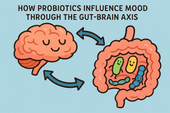
How Probiotics Influence Mood Through the Gut-Brain Axis
Discover how probiotics can do more than support your digestion—they can actually uplift your mood. This article explores the fascinating gut-brain axis and how balancing your gut bacteria through probiotics may help reduce anxiety, improve emotional stability, and support long-term mental well-being. 🌿🧠
-
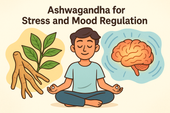
Ashwagandha for Stress and Mood Regulation
Discover how Ashwagandha, the powerful adaptogenic herb 🌿, helps your body manage stress and regulate mood. Learn how it balances cortisol, boosts GABA and serotonin, and supports emotional stability — helping you feel calm, focused, and resilient every day.
-

St. John’s Wort: Natural Support for Mild to Moderate Depression
Discover how St. John’s Wort, the “sunshine herb” 🌼, naturally supports mild to moderate depression. Learn how it boosts serotonin, balances mood, and promotes emotional resilience — with research showing its effectiveness compares to antidepressants, but with fewer side effects.
-
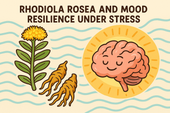
Rhodiola Rosea and Mood Resilience Under Stress
Discover how Rhodiola rosea helps your body adapt to stress 🌿. Learn how this powerful adaptogen balances cortisol, supports serotonin and dopamine, and strengthens emotional resilience — helping you stay calm, focused, and energized under pressure.
-

Chamomile and Lavender: Herbal Calm for Emotional Fluctuations
Discover how chamomile and lavender bring calm to emotional ups and downs 🌿. Learn how these two soothing herbs balance your nervous system, ease anxiety, and support restful sleep — naturally helping you find peace and emotional stability.
-
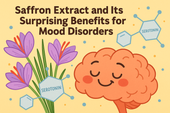
Saffron Extract and Its Surprising Benefits for Mood Disorders
Discover how saffron extract — the golden spice of joy 🌸 — can naturally support mood balance, ease anxiety, and lift mild depression. Learn what science says about its serotonin-boosting power, the ideal dosage, and how this ancient remedy compares to modern antidepressants.
-
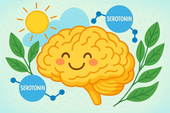
5-HTP and Serotonin: A Natural Path to Lifting Mood
Discover how 5-HTP naturally boosts serotonin 🌞 — the neurotransmitter behind mood, sleep, and emotional balance. Learn how this plant-derived compound supports happiness, reduces anxiety, and improves rest by helping your brain create more serotonin the gentle, natural way.
-
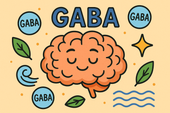
GABA Supplements for Reducing Anxiety and Mood Swings
Discover how GABA supplements can help reduce anxiety and balance mood naturally 🌿. Learn how this calming neurotransmitter works to quiet the mind, ease stress, and improve sleep — plus which nutrients and habits can boost your body’s own GABA production for long-term emotional stability.
-
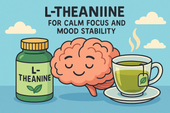
L-Theanine for Calm Focus and Mood Stability
Discover how L-theanine, the calming compound found in green tea 🍵, promotes focus, relaxation, and mood stability. Learn the science behind how it balances neurotransmitters, reduces stress hormones, and enhances clarity — helping you stay centered, calm, and productive without sedation.
-
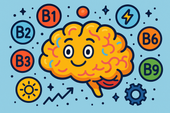
B Vitamins and Brain Chemistry: Supporting Energy and Emotional Balance
Discover how B vitamins power your brain chemistry ⚡. Learn how B6, B9, and B12 support serotonin, dopamine, and energy production — helping boost focus, mood, and emotional balance. From diet to supplements, explore how this vital nutrient group keeps your mind resilient and your energy steady.
-

N-Acetyl Cysteine (NAC) and Mood Disorders: What the Research Says
Learn how N-Acetyl Cysteine (NAC) supports brain health and mood balance 🧠. Discover how this antioxidant helps reduce oxidative stress, regulate glutamate, and improve emotional stability in depression, bipolar disorder, and anxiety — backed by cutting-edge psychiatric research.
-

Supplements for Bipolar Disorder: What May Support Stability
Discover the best supplements for bipolar disorder 🌿 that may support emotional stability and brain health. Learn how nutrients like omega-3s, magnesium, vitamin D, and NAC can help reduce inflammation, balance neurotransmitters, and complement traditional treatment safely.

















































